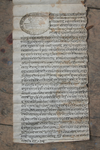A letter from Deva Śamśera ordering to enforce customary fees on mogalāniyā traders before conducting business in Pācapārvā (VS 1946)
ID: Tsum_0001_0002
Edited and
translated by Nadine Plachta and Rajendra Shakya
Created: 2017-05-16;
Last modified: 2020-02-12
For the metadata of the document, click here
The accompanying edition, translation/synopsis and/or commentary are available under the terms of the Creative Commons Attribution-ShareAlike 4.0 International License
Abstract
In response to the petition of Dāvā Ḍāṃḍu Bhoṭe, the jimmāvāla of Chiluṃ Gāũ, Deva Śamśera orders Captain Candramāna Kārkī to ensure that foreign traders pay the customary fees to local population before trading in Pācapārvā of Syāra.Diplomatic edition
[1r]
[Seal of Deva Śamśera]1स्वस्तिश्रीमद्राजकुमारकुमारात्मजश्रीकम्याँडरइनचि2फजनरलदेवसम्सेरजङ्गराणावहादुरकस्यपत्रम्
3आगेमेजरकपतान्चन्द्रमानकाकिक्षत्रीकेयथो
4चित्तउप्रान्त∙अघिपरापुर्वदेषिमोगलानाचंग्या[...]
5गाउ१स्यालमेगाउ१योदुईगाउसालवसाल्[...]
6उन्याअरूगाऊगाउकावेपारिहरूभन्याकैलेकैले
7मात्रवेपारगर्नहाम्रास्यारपट्टिपाचपार्वामावेपारगर्नआऊदाभेडागोटा६कोनुन्धो
8क१चौरि⟪१⟫कोनुनधोक्१कादर्लेदस्तुरभावनिजहरूलेहामिहरूलाईवुझाऊन्यागरिआ
9उन्यामासोवुझायाकोगौराईआम्दानिसालवसाल्हाम्रागाऊमाआउन्याराजका
10जकासरसिपाहिहरुलाईषुवाउनेगर्न्यायस्तोरितपुर्षादेषिषाईपाईआयाकोहो
11हाम्रास्यारपट्टिपाचपार्वाकागाउगाऊकामानिसहरूलेपनिसोमोगलानगाउगा
12उमावेपारगर्नजादामाथिलेषियावमोजिम्हामिहरूसंगभन्याअद्यापिवरावरलिंछ
13न्हामिलाई∙दिन्यादस्तुरभन्या४५साल्कावालिदेषीहामिलाईनदिहिमायतगरीर
14हेछप्रभु∙सोआम्दानिभन्याहामिले∙लोकाभारमावुझाउन्यागरिआयाकोछउछसो
15दस्तुरआजकालनिजमोगलानिञाहाहरूलेनवुझाईषालिवेपारमात्रगरि१दाम्१
16मुठिनुंदस्तुरहामिलाईनवुझाईतेसैहिमायत्गर्छन्नलाग्न्याहो∙भन्याअघिवुझाउ
17नुपर्दैनसावीक्देषिलाग्याकैदस्तुरहोभन्याआजहाम्रालोकाभारमासोआम्दा
18नि∙दरियापछिषालिवेपारमात्रगरिदस्तुरगौराईनवुझाईहाम्रालोकाभारठेग
19माटुटापर्नपाउन्याहोईनसाविक्देषिवुझाइआयाकोदस्तुरवुझाउछन्भन्यानि
20जमोगलानीञाहरुलाईहाम्रास्यारपट्टिपाचपार्वामावेपारगर्नआउन्यावेपारिलाई
21वेपारगर्नदिनुअघिदेषिवुझाईआयाकोचौरि१कोनुंधोक१भेडागोटा६कोनु
22न्घोक१कादर्लेवुझाउदैनंभन्यानिजहरुलाईवेपारगर्ननदिनुभन्यावेहोराकोसन
23दगरिपाउभन्न्याछिलुंगाऊवस्न्याजिम्मावाल्दाव़ाडांडुल्भोटेले४६साल्फागु
24णसुदि९रोज६माहाम्राहजुर्माविन्तीपार्दाजाहेरभयोतसर्थसोमोगलानीञावेपा
25रिहरुलेहाम्रासरहदमावेपारगर्नआउदाचौरि१कोनुन्घोक१भेडागोटा६को
26नुन्घोक१साविकदेषिदस्तुरदिआयाकारह्याछन्रहाल४५सालदेषीनीजवे
27पारीहरुलेदस्तुरनदीअडियाकारहेछन्भन्यायेसवाटनीजमोगलानिञावेपारीह
28रूकानाउमावादिमुचुल्कालीदोसाधिकचहरीगरीसाविकदेषीतीरीआयाकोद
29स्तुरतिर्न्यावन्दोवस्तवाधीछिनीदीनुवेहोराआर्कैरहेछरअड्वड्पर्योभन्याजा
30हेरगरीपठाउनुरजवाफवक्स्यावमोजिम्गर्नुइतिसम्वत्१९४६सालमिती
31चैत्रसुदी२रोज७शुभ्म्¯¯¯ ¯¯¯ ¯¯¯ ¯¯¯ ¯¯¯ ¯¯¯ ¯¯¯ ¯¯¯
Translation
[1r]
Hail! A letter from Commander-in-Chief General Deva Samsera Jaṅga Rāṇā Bahādura, the venerable prince born of a prince.
Āge: to Major Captain Candramāna Kārkī Chetrī.
Uprānta: "Since the distant past, [traders] from two mugalāna villages of Caṃgyā[...] Gāũ - 1 and Syālme Gāũ - 1, who come every year to conduct business, and the traders from other villages who only come occasionally to conduct business in our Pācapārvā1 [region of] Syāra2 , have been paying us customary fees at the rate of one dhok3 of salt for six sheep and one dhok of salt for one yak. The gaurāī income [thereby] received was [used] for feeding the military personnel coming to our village every year on royal duty. Such has been the tradition in practice for many generations. [Similarly,] when the people from the villages of Pācapārvā [on] our side [of] Syāra go to the villages of mugalāna to trade, [they] have regularly been taking [the same customary fees] mentioned above from us to this day. Regarding the customary fees that [the mugalāniyā4 traders] are supposed to pay to us, it turns out that [they] have persistently been failing to pay [them] since the harvest of the year [VS 19]45 (1888 CE).
My lord, the amount [received] we have been depositing under the lokābhāra system. These days the mugalāniyās do not pay, but merely trade; they persistently do not pay [even] one dāma [or] one handful of salt [as] customary fees. If [fees] are not applicable, [they] do not need to pay any in advance [of doing business] the past. [However] if fees have been imposed customarily and they [can] trade only after that income has been registered under our system of lokābhāra [in effect] today, then there will no [longer] be any loss to find in the ṭheka allocated under our lokābhāra [as a result of their] not paying the gaurāī fee. Permit the mugalāniyā traders to trade in our Pācapārvā [region of] Syāra only if they pay the customary fees, but do not allow them to trade if they do not pay one dhok of salt for one yak and one dhok of sald for six sheep, as was paid customarily [in the past]."
This came to light when JimmāvālaDāvā Ḍāṃḍul Bhoṭe5 , who lives in Chiluṃ Gāũ, submitted [such] a petition to us on Friday, the 9th of the bright fortnight of Phālguṇa in [VS 19]46 (1890 CE), praying that a sanada be issued with the details: "Permit the mugalāniyā traders to trade in our Pācapārvā [of] Syāra only if they pay the customary fees, but not allow them to trade if they do not pay one dhok of salt for one yak and one dhok of salt for six sheep as it was paid customarily."
Therefore, if it is true that those mugalāniyā traders, while coming to trade within our boundaries, [are required to] pay one dhok of salt for one yak and one dhok of salt for six sheep as customary fees, and that they have stopped paying the fees since [VS 19]45 (1888 CE) and are adamant about not paying, then settle [this case] by holding a Dosādhi Kacahari6 after taking a muculkā from the plaintiff, and enforcing the system of paying the customary fees. [However,] if it turns out that the facts are different [from what has been said] and complications arise, bring it to our notice and do [as instructed] in [our] reply.
Saturday, the 2nd of bright fortnight of Caitra in the [Vikrama] era year 1946 (1890 CE). Auspiciousness.
Commentary
This document confirms that the Syāra region, locally known as Tsum tsho bcu gsum, was a destination for foreign traders from Tibet, while the Tsumpās, the residents of Tsum, also went to Tibet and traded by paying customary fees. The term mugalāna usually refers to India, but in the above context it is a general term for "foreign land". The two mugalāna villages mentioned in the document are probably situated in Tibet. Another document from the upper Gorkha region called L_1200_0009G mentions 'Bhoṭes from mugalāna'. Bhoṭe is a generic term for people of Tibetan origin. This makes it clear that the term mugalāna can also refer to Tibet.
The document shows that the customary fees imposed on foreign traders were not a local tradition but a state-governed practice, and some of the income was used for serving the government officials who come to the region on state business.

